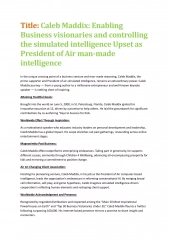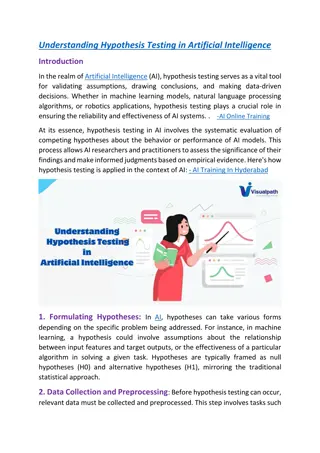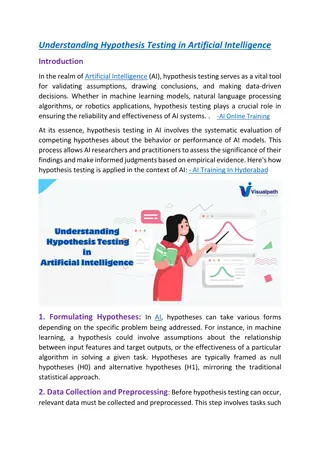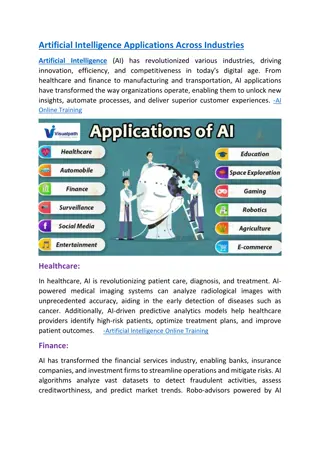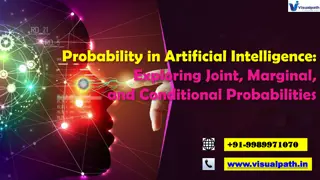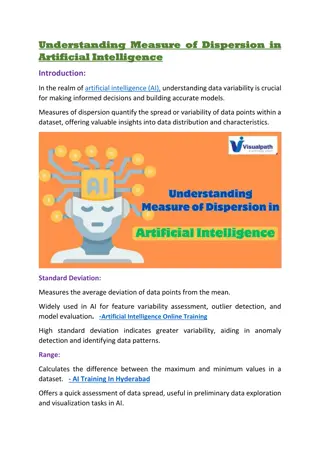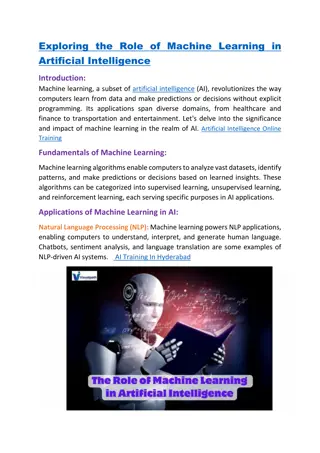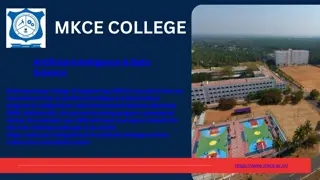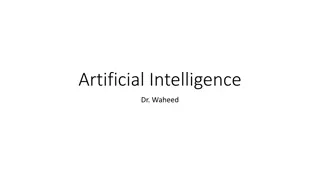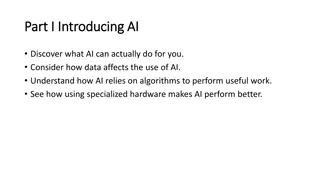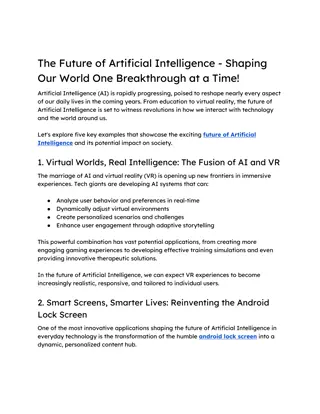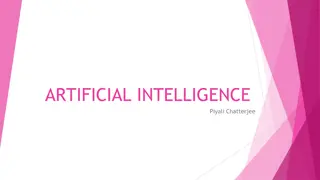Possibility of Using Artificial Intelligence in Library Activities
Discuss the use of artificial intelligence in libraries, focusing on literature analysis, searching and selecting scientific resources, defining AI criteria, and showcasing applications. Explore the relationship between AI and library tasks, based on queries from various databases.
Download Presentation

Please find below an Image/Link to download the presentation.
The content on the website is provided AS IS for your information and personal use only. It may not be sold, licensed, or shared on other websites without obtaining consent from the author.If you encounter any issues during the download, it is possible that the publisher has removed the file from their server.
You are allowed to download the files provided on this website for personal or commercial use, subject to the condition that they are used lawfully. All files are the property of their respective owners.
The content on the website is provided AS IS for your information and personal use only. It may not be sold, licensed, or shared on other websites without obtaining consent from the author.
E N D
Presentation Transcript
The possibility of using methods and techniques of artificial intelligence in the library activities Jolanta Szulc Institute of Library and Information Science University of Silesia in Katowice, Poland KNIHA VE 21. STOLET , Opava, 2016
Objective The aim of the presentation is to discuss the possibility of using methods and techniques of artificial intelligence in library activities. To achieve this objective the analysis of literature accumulated on the basis of queries in selected databases: LISA and LIST was conducted.
Content Searching and selecting scientific literature Definitions and criteria for the classification of artificial intelligence Examples of applications of artificial intelligence in libraries Conclusions
Searching and selecting scientific literature
LISA: Library and Information Science Abstracts Search term Number of records 779 Artificial intelligence AND Library work Date of publication 1970-1979 1980-1989 1990-1999 2000-2009 2010-2016 Number of records 19 207 204 262 86 Source type Scientific journals Number of records 779
LISA (access: 15.02.2016) Publication title Number of records 95 61 49 49 30 27 17 .. 15 .. 5 .. 2 .. Artificial Intelligence AI Magazine Artificial Intelligence in Medicine Artificial Intelligence Review Artificial Intelligence and Law IEEE Intelligent Systems AI Communications Library Hi Tech Kniznice a Vedecke Informacie Small Computers in Libraries
LISA (access: 15.02.2016) Publication type Journal Article Bibliography Book Review Conference Report Number of records 778 1 1 1
LISA (access: 15.02.2016) Subject Number of records 414 247 193 183 165 163 128 .. .. 11 11 .. 5 5 artificial intelligence information work information storage and retrieval subject indexing technical services computerized information storage and retrieval searching cataloguing librarianship libraries online cataloguing
LISA (access: 15.02.2016) Classification Number of records 51 23 19 COMPUTER APPLICATION COMPUTER SCIENCE AUTOMATIC TEXT ANALYSIS, AUTOMATIC INDEXING, MACHINE TRANSLATION MANAGEMENT OF COMPUTING AND INFORMATION SYSTEMS (CI) INFORMATION WORK COMPUTERIZED INFORMATION STORAGE AND RETRIEVAL CLASSIFICATION LIBRARIANSHIP AND INFORMATION SCIENCE .. LIBRARY TECHNOLOGY - NETWORKS RESEARCH SUBJECT INDEXING 8 7 6 .. 4 .. 2 .. 1 1 1
LISA (access: 15.02.2016) Language Number of records 696 23 11 11 10 5 4 3 2 2 2 2 2 .. English Russian German Japanese French Czech Swedish Chinese Italian Polish Portuguese Slovak Spanish
LISA: Library and Information Science Abstracts (access: 15.02.2016) Search term Number of records 4281 artificial intelligence library Date of publication 1960-1969 1970-1979 1980-1989 1990-1999 2000-2009 2010-2016 Number of records Source type Number of records 1 Journal article Book review Conference report Feature Bibliography 4273 19 9 2 1 30 300 1742 1716 481
LISTA: Library, Information Science & Technology Abstracts (access: 15.02.2016) Search term Number of records 13 Artificial intelligence AND Library work Date of publication 1970-1979 1980-1989 1990-1999 2000-2009 2010-2016 Number of records 0 4 4 2 3 Source type Number of records 8 4 1 Magazines Academic journals Books
Definitions and criteria for the classification of artificial intelligence
Definitions and terms of AI (1) 1) Sztuczna inteligencja to nauka polecania maszynom wykonania zada wymagaj cych inteligencji, jak u y by cz owiek przy wykonaniu identycznych zada . (Minsky 1968) 2) Sztuczna inteligencja jest t cz ci informatyki, kt ra bada procesy rozumowania symbolicznego i niealgorytmicznego oraz zajmuje si reprezentacj symbolicznie uj tej wiedzy. (Forsyth 1984) 3) Sztuczna Inteligencja to ekscytuj ce pr by stworzenia my l cych komputer w [ ], maszyn z umys ami w pe nym tego s owa znaczeniu. (Haugeland 1985) 4) Sztuczna Inteligencja jest reaktywowanym podej ciem do rozwi zywania problem w, kt re wymaga wewn trznego, heurystycznego, poszukiwania w czasie operacji na bazie wiedzy, zw aszcza dla logicznych i analogicznych mechanizm w rozumowania. (Glover, Greenberg 1989)
Definitions and terms of AI (2) 5) Sztuczna Inteligencja to dziedzina bada , podczas kt rych pr buje si na ladowa ludzk inteligencj w maszynie. Obszar AI obejmuj systemy oparte na wiedzy, systemy eksperckie, rozpoznawania obraz w, automatyczn nauk , rozumienie j zyka naturalnego, robotyk i inne. (Kurzweil 1999) 6) Sztuczna Inteligencja jest to nauka o czynno ciach, kt re mia yby spowodowa , e maszyny b d wykonywa funkcje, kt re aktualnie lepiej wykonuje cz owiek. (Rich, Knight 1990) 7) Sztuczna Inteligencja jest to dziedzina nauki pr buj ca wyja ni i emulowa inteligentne zachowania za pomoc metod obliczeniowych. (Schalkoff 1990)
Definitions and terms of AI (3) 8) Sztuczna inteligencja [podejmuje] prace nad metodami obliczeniowymi, kt re umo liwia yby [maszynom] postrzeganie, wnioskowanie, dzia anie. (Winston 1992) 9) Termin Artficial Intelligence, w skr cie AI, odnosi si do komputer w, kt re na laduj aspekty ludzkiego my lenia. Prosty kalkulator elektroniczny nie ma statusu AI. Ale maszyna, kt ra mo e uczy si na swych b dach, albo to mo e popisa si rozumowaniem, ma status AI. Mi dzy tymi skrajno ciami, nie ma adnej dok adnej linii podzia u. (McGraw 1994) 10) Dziedzina Sztucznej Inteligencji (AI, Artificial Intelligence) obejmuje rozwi zywanie problem w sposobami wzorowanymi na naturalnych dzia aniach i procesach poznawczych cz owieka, za pomoc symuluj cych j program w komputerowych (Kwa nicka 1990)
Criteria for the classification of AI (1) Due to the lack of universally accepted criteria for the distribution of artificial intelligence suggested its division into subareas due to two criteria: solving class of tasks, technique used.
Criteria for the classification of AI (2) The following areas of AI are distinguished (according to the first criterion): automated theorem proving, automatic programming, computer vision, expert systems, game theory, information retrieval (intelligent database) machine learning , natural language processing (NLP), problem solving and strategies searches, processes of perception, robotics .
Criteria for the classification of AI (3) The following areas of AI are distinguished (according to the second criterion): Case-Based Reasoning (CBR) Expert Systems (ES), Fuzzy System (FS), Genetic Agorithms, Intelligent Information Systems (IIS), Neural Network (NN).
Examples of applications of artificial intelligence in libraries
Semantic Geo-Catalogue (SGC) project The enhancement of the search capabilities of geo-spatial tools occupies one of the highest positions in the agenda of the INSPIRE (INfrastructure for SPatial InfoRmation in Europe) initiative. The paper presents work on the Semantic Geo-Catalogue (SGC) project in providing a semantic extension to the geo-catalogue of the Autonomous Province of Trento (PAT) in Italy. F. Farazi, V. Maltese, B. Dutta, A. Ivanyukovich, V. Rizzi: A semantic geo-catalogue for a local administration. Artificial Intelligence Review Vol. 40 (Aug 2013), p. 193-212
Expert systems in library and information science Methods: An analysis was made of the literature, gathered on the basis of queries in some databases. The article discuses directions of research in the field of expert systems as one of the methodologies of knowledge management, using methods of artificial intelligence: problem solving and representation of knowledge (generation, valuation and knowledge management, extraction and synthesis of knowledge in the construction of expertise), "self learning", evaluation of performance. In conclusion, it attempts to identify possible areas of applications in libraries and information centers. J. Szulc: Systemy ekspertowe w dzia alno ci bibliotecznej i informacyjnej: stan bada , problemy badawcze, przyk ady zastosowa . Zagadnienia Informacji Naukowej. Studia Informacyjne Vol. 52, no. 1 (103) (2014), s. 94-118.
Expert systems in library and information science
Expert systems in library and information science
Expert systems in library and information science
Expert systems in library and information science Examples of expert systems: ESSCAPE (Exeter of University , UK, 1982-1983, ) MAKLUM (Malaysian, 1996) DOCMATCH (University of Bradford, UK, 1996)
Expert systems in library and information science Conclusions: Quantitative analysis of the literature showed a significant decrease in the literature devoted to expert systems after 2010. Nevertheless expert systems (experimental, operated) are used in many fields. It is expected that these systems will be used in specialized libraries in the collection and codification of knowledge in selected areas of specialization.
Other applications of AI: Application of intelligent agents in libraries Chatbots in the library Semantic research for digital libraries
Conclusions Analysis of the literature showed the maintenance of a relatively large number of publications on AI Relatively few article relates to uses of AI in libraries Scientific literature was grouped in categories such as: automatic text analysis, automatic indexing, computer application, computer science, machine translation and other Examples of applications of AI relate to uses of such fields of library and information science as: classification, library technology, research, subject indexing and other Interdisciplinary character of the research is to be noticed the disciplines penetrate and complement each other
Conclusions Applicability AI in different types of libraries is still not fully successful. Various methods and techniques AI can greatly assist the process of ordering and information flow.


